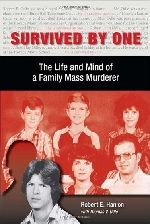Serial Killers
Q&A with Dr. Robert Hanlon
Hanlon is the author of 'Survived By One'—the life of the killer, Tom Odle
Posted September 23, 2013

I recently reviewed Dr. Robert Hanlon‘s book, Survived By One. The book describes Hanlon’s relationship with Tom Odle, a killer serving life in prison in Illinois for murdering his entire family. This was the first time that I had really gained any insight into the topics of familicide and parricide—the killing of one’s family, and the killing of one’s parents, respectively. Anyone who has explored the question of why people kill (especially as it seems to relate to a loop hole or simply a hole in their conscience) knows that there is no easy answer, and it is easy to get lost in the dynamics of a person’s brain or their mind. With regards to the motivations and experience of Tom Odle, I believe Dr. Hanlon has done a fantastic job in laying it out there for us so that we can comfortably approach the question under the guidance of a professional.
I had the good fortune to be able to ask Dr. Hanlon a number of questions regarding the book, and about the life of Tom Odle and his family.
Q&A With Dr. R. Hanlon
Q1: Dr. Hanlon, would you mind explaining the job of a neuropsychologist? For example, when you are evaluating patients or clients, are you seeking to determine cellular and tissue health as well as to approach a diagnosis from a behavioral point of view?
Neuropsychological evaluations are typically conducted to objectively determine the presence, type, extent, and severity of neurocognitive dysfunction and neurobehavioral abnormalities. As such, the objective of neuropsychological evaluations is usually to determine the psychological effects of brain disorders and brain damage. Additionally, a neuropsychological evaluation of a criminal defendant may also involve other forensic questions, such as fitness to stand trial, sanity, and capacity to make a knowing and intelligent waiver of Miranda rights.
Q: Tom Odle contacted you while in prison to help gain some life perspective. Is it unusual for prisoners to contact you in this way?
Yes. No other inmate or criminal defendant has ever contacted me before or after a neuropsychological evaluation.
Q: Odle murdered his entire family on Nov 8th, 1985 (both of his parents, his two younger brothers, and his younger sister). It’s purely speculative, but how likely do you think it is that Odle would have killed more people if not apprehended?
It is very unlikely that he would have murdered anyone else. Murdering his mother was the driving force behind the family mass murder and killing his mother was his primary objective. Unfortunately, his worsening depression, increasing sense of desperation, and acute feeling of abandonment escalated into a homicidal rage that resulted in a nihilistic, drug-fueled termination of the family. He would have likely committed suicide if he had not been arrested.
Q: I really enjoyed the way you worked through Tom’s young life and discussed a number of life events that no doubt had a very profound effect on his mind (and brain). Clearly, he suffered a lot of psychological and physical abuse from his mother. Do you think she would have met the diagnostic criteria for Antisocial Personality Disorder?
No. Although I believe she possessed some antisocial traits, she also possessed borderline personality traits and sadistic personality traits.
Q: The dynamic of Tom’s parents, Carolyn and Robert Odle, would strike many as odd. You mentioned that perhaps Carolyn was hard on her children because she was exercising control that she never had when she had been abused as a child. But why do you suppose Robert did little to stop the abuse carried out by Carolyn?
The family dynamics in abusive households are often complex. However, it is not uncommon for one parent to be the primary abuser and the other parent to be aware of the abuse, but do nothing to stop it.
Q: Tom was the eldest child, and you mentioned that his younger brothers, Scott and Sean, were also abused. Do you think Scott and Sean would have met the criteria for Conduct Disorder, like Tom, and perhaps eventually followed a similar path to killing?
Sean was also abused by his mother. In fact, Sean likely sustained worse abuse than Tom. Sean was deprived of food by his mother, whereas Tom was never deprived of food. Sean was also abused by Tom and Carolyn likely encouraged Tom to abuse Sean. To my knowledge, Scott was never abused. In my opinion, neither Sean nor Scott would have met criteria for conduct disorder.
Q: I once attended a conference about psychopathic serial killers, and one of the speakers, Dr. Lawrence J. Simon, had worked as a psychologist on Death Row in Florida for many years. He explained that a reoccurring theme in the lives of male killers was an abusive mother and an emotionally or physically absent father. In your experience, does this also seem to be the case?
A history of abuse is a common thread. In many cases, the mother was the abuser, but in many other cases, the father was the abuser. In some cases, both parents were abusive.
Q: Does Odle fit the profile of a serial killer? The F.B.I., I think, now describes a serial murderer as somebody who has killed two or more people with a cooling off period in between murders. The murders on Nov 8th, 1985, were spaced out over a few hours. Serial murder is often premeditated, too, but Odle’s decision to kill his family seemed very last minute. How closely do you think Odle meets the profile of a serial killer?
He is not a serial killer. Although the murders of the Odle family members occurred over a period of several hours, all murders occurred in the Odle home and all victims were family members.
Q: There has been a lot of research over the last decade that has used brain scanning technology to examine physical and functional differences in the brains of those with serious personality disorders and criminals who have been found guilty of murder and rape. Did Odle ever have a brain scan?
The only neuroimaging that he underwent was a CT scan of his brain shortly before the first pretrial forensic evaluations were conducted. Not surprisingly, the CT scan of his brain was negative (i.e., normal).
Q: One thing that seemed abundantly obvious was that Odle had problems understanding emotions. For example, he mentions that music was full of emotion that he was unable to express, and later he admits that he had trouble understanding lyrics. It is often observed that those with antisocial or psychopathic traits are unable to understand emotion. Do you think Tom’s experience with music was already evidence that his brain had not developed as it should?
No.
Q: Odle spent two weeks in the Army. Do you know if he received a psychological examination?
I am not aware of a psychological evaluation while he was in the military. He was discharged due to physical issues (i.e., knee injury).
Q: It was only two weeks, but do you think the Army had any lasting impact on Tom, such entertaining any ideas about killing?
I think the Army was one of the best opportunities he ever had. If he had stayed in the Army, it is very unlikely that he would have murdered his family.
Q: Odle’s account of the murders is chilling. He claimed that there was a voice, his own voice, in his head, instructing him to end his family. There are numerous ways to interpret this, but to me it seems like his past was so painful and it had basically shaped him in such a way that he could not successfully approach any kind of future. So the killing was a means of ending all of this pain and exorcizing many past and personal demons. Do you think the house where he grew up and ultimately committed the murders, played a role in the killings? Would he have killed the family outside of the family home?
It is very unlikely that he would have killed any family members outside of the home. In the home, they were captive and concealed.
Q: Odle spoke of being very depressed and even felt suicidal at times. In fact, he had wanted to end his own life after he took the lives of his family. This also seems to set him apart from serial killers, who have no intention of committing suicide while they are still free kill others. However, a number of killers, especially spree killers and suicide bombers, seem to have no regard for their own life. Do you think having a ‘sense of future’ would help to prevent certain kinds of murders?
It is important to note that Tom Odle is not a serial killer and does not have the mentality of a serial killer. At the time of the murders, he had the mentality of a mass murderer, specifically a family mass murderer. Like many family mass murderers, the motive was to terminate the family unit and subsequently commit suicide. However, he delayed his suicide and was arrested in the interim. Yes, having a realistic sense of future is important in preventing domestic homicides of this type.
 Dr. Robert E. Hanlon is a board-certified Clinical Neuropsychologist with a specialization in forensic neuropsychology and is an Associate Professor of Clinical Psychiatry and Clinical Neurology at Northwestern University’s Feinberg School of Medicine in Chicago. He has more than a quarter-century of experience as a forensic expert, having evaluated hundreds of murder defendants and death-row inmates, and testifying in many trials. For the past 17 years, he has served as the director of the Inpatient Neuropsychology Service at Northwestern Memorial Hospital in Chicago. He is also the director of Neuropsychological Associates of Chicago, involved in clinical assessment, consultation, forensic neuropsychology, teaching, and research. His degrees include the following: Ph.D., M.Phil., M.S. and B.S.
Dr. Robert E. Hanlon is a board-certified Clinical Neuropsychologist with a specialization in forensic neuropsychology and is an Associate Professor of Clinical Psychiatry and Clinical Neurology at Northwestern University’s Feinberg School of Medicine in Chicago. He has more than a quarter-century of experience as a forensic expert, having evaluated hundreds of murder defendants and death-row inmates, and testifying in many trials. For the past 17 years, he has served as the director of the Inpatient Neuropsychology Service at Northwestern Memorial Hospital in Chicago. He is also the director of Neuropsychological Associates of Chicago, involved in clinical assessment, consultation, forensic neuropsychology, teaching, and research. His degrees include the following: Ph.D., M.Phil., M.S. and B.S.




